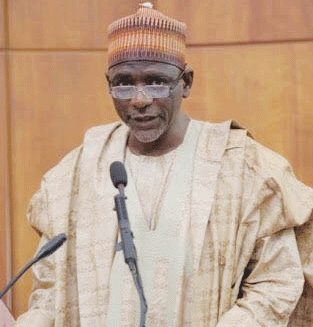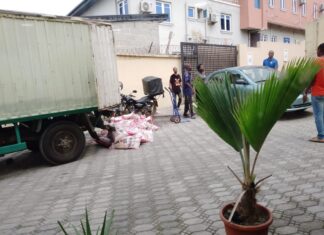Hajia Aisha Yesufu, a co-founder of the BringBackOurGirls group has tasked the Federal Government to ensure that the controversy over the actual number of our #BuniYadiHeroes who were cut down brutishly in Government Secondary School, Buni Yadi during the night of February 25, 2014 be accurately established immediately.
For, two years after their brutal murder in their dormitories by Boko Haram insurgents, disturbingly loud controversy still persists about whether or not 59 or 29 students were killed in Buni Yadi, Yobe State that night.
Moreover, the government must acount for and ensure that the remaining schoolchildren, the teaching and non-teaching staff of the college are reabsorbed into other Unity Schools across Nigeria to continue their education in the short term while the government decides on when their school will be rebuilt when it comes in under the Safe School Initiative, among other urgent questions.
In a brief but solemn ceremony to commemorate the dead students on the second anniversary of the tragedy, Hajia Yesufu said the government must listen to the parents of the slain students, address their concerns and open trauma centres to counsel those who still need it.
Her full address at the ceremony reads:
We welcome you all with heavy but grateful hearts to this solemn event.
Today, we assemble to honour the memory of our brave boys of Federal Government College (FGC), Buni Yadi, murdered in their school by Boko Haram terrorists 2 years ago today on February 25, 2014.
On this day two years ago, a rampaging band of killers laid siege on the FGC, Buni Yadi. They separated the boys from the girls and slit the throats of 29 of them afterwards. The only ‘crime’ of our Buni Yadi schoolboys was that they were bold and ambitious enough to seek a better and more assured future through education.
The misguided killers consider education and our liberties as citizens and humans as a crime that deserves brutish extermination. But in death, our Buni Yadi boys stand taller. Our boys are HEROES for even daring to get educated in an environment that had become hostile to their collective aspirations.
Further to that, of the 29 who were murdered, only 8 were junior students. The remaining 21 were senior students whom we are told stayed back to help the junior students escape instead of self-preserving by running for dear life, and ran out of time.
They are symbols of hope to every child who will dare to dream and be brave enough to pursue same. Their stories, heroics and humanity humble us today. And, for ages to come, their sacrifice will be told by men and women of conscience.
The grief of their families and friends were made worse by the poor response, especially by the federal government and its line agency directly responsible for the management of the school, the Federal Ministry of Education.
After their murder the relations of the deceased were not reached and consoled. They were allowed to grieve alone. It is unacceptable for ours to be a society that lacks humanity. This disaster was treated in such a perfunctory manner that for 2 years, the exact numbers and names of victims are uncertain, as the government did not publish the names, and identities.
The relations were only half-heartedly contacted after our 1-year remembrance, last year. We find this unacceptable. The welfare of citizens is the primary duty of government.
The pain of their gruesome death still pierces through the walls of our hearts. Words alone cannot capture the harrowing experience their parents and other relations have been subjected to. Our children, both boys and girls, must never be made to choose between staying alive and getting education.
It would be recalled that on 29 September 2013, the terrorists attacked and killed 44 students of College of Agriculture, Gujba in Yobe State. Not much was done, hardly any lessons learnt, which resulted in the attack on FGC Buni Yadi, in the same state.
Not much was done, hardly any lessons learnt, the terrorists who hitherto attacked only boys, got emboldened and abducted 276 schoolgirls of Government Secondary School, Chibok on April 14, 2014.
As we commemorate our young heroes today, we specially demand of the federal government to:
1. Ensure that the controversy over the actual numbers of our #BuniYadiHeroes who were cut down brutishly be immediately established.
How many boys were killed in Buni Yadi on the 25th of February, 2014? Was it 59 or 29?
Less than 2 weeks ago, during our #BBOGMonthlyMonitoringInitiative we explained the importance of government swiftly owning the narrative, dignifying the citizens, and resting all speculations by publishing the names and identities of victims of attacks and/or of those rescued.
The media promoted the news of those killed in the Buni Yadi attacks. Considering that our movement sources information primarily from verifiable media outlets, last year, we published 59 names collated from residents of Buni Yadi and the media.
However, we have obtained from the school, 29 names as confirmed from the parents represented here. It is of utmost importance for the government to put this controversy to rest once and for all.
2. Ensure that the parents and relations are listened to, with all concerns addressed. We consider it an opportune time for the federal government to set up trauma and grief counselling centres across the country, in view of the incalculable tragedies that have ravaged especially the Northeast region since the Boko Haram insurgency with attendant consequences.
3. Account for, and ensure that the remaining schoolchildren, the teaching and non-teaching staff of the FGC Buni Yadi, are reabsorbed into other Unity Schools across Nigeria so that they can continue their education in the short term. When shall their school be rebuilt? Where does the school come in under the Safe School Initiative? We task interest groups like the Unity Schools Old Students Association (USOSA) and others to take up this matter and pursue it to its conclusion.
Our society must see and accept that one of the surest ways out of the primitivity, poverty and the attendant hopelessness that aided the emergence of the misguided insurgents in the Northeast is the rejuvenation and revival of the comatose educational system in the country.
The responsibility to educate our children and ensure that all of them acquire a good education to develop human capital which is our key and most important resource is non-negotiable, and is on the Nigerian society.
The federal government must take the lead with political will and an improved framework that not only secures our children and the lives of every stakeholder, from the parents to the teachers, many of whom have also become victims, but ultimately ensures education never stops for any child.
Education and our liberties are under attack. This must be seen as a new mandate: Education Must Continue no matter the tragedy! The implementation of the objects and goals of the Safe Schools Initiative must, as a matter of urgency, be moved off the drawing boards, dusty shelves and selective deployment approach onto achievable action-driven and verifiable timelines.
The education sector deserves emergency attention, if we must avoid an imminent social conflagration and econo-industrial stagnation. The sector is a major tool that can deliver the prosperous future that we dream and aspire to for our great country, Nigeria.
Thank you.
Signed:
For and on behalf of #BringBackOurGirls
AISHA YESUFU
OBY EZEKWESILI
HADIZA BALA USMAN
SCHOOLBOYS MURDERED AT FEDERAL GOVERNMENT COLLEGE, BUNI YADI ON FEBRUARY 25, 2014
1. Abba Adam (SS 3)
2. Abbas Ali Mohammed (SS 2)
3. Abbas Ibrahim Abdul (SS 1)
4. Abiodun Josef (SS 3)
5. Abdu Sherif Ibrahim (SS 1)
6. Abdullahi Adamu (SS 3)
7. Abdulmalik Mohammed (SS 3)
8. Aliyu Musa (SS 3)
9. Awal Adam (SS 1)
10. Bamai Ali Goni (SS 3)
11. Bashir Lamido (SS 1)
12. Bashir Mai Gana (SS 3)
13. Hedima Likita Mari (JS 3)
14. Ibrahim Ali (JS 2)
15. Ibrahim Sommy (JS 2)
16. Isa Elisha (JS 3)
17. John Peter (JS 1)
18. John Wando (JS 3)
19. Mohammed Abdullahi Daya (JS 3)
20. Mohammed Ali Hassan (SS 1)
21. Mohammed Aminu Abubakar (SS 1)
22. Musa Yalti Buba (SS 1)
23. Mustafa Abubakar Ali (SS 3)
24. Shuaibu Ali (SS 3)
25. Solomon Kwmta (SS 1)
26. Suleiman Mohammed Gussa (SS 3)
27. Usman Abba Kawagu (JS 2)
28. Usman Mai Saleh (SS 3)
29. Yahuza Ali Auta (SS 3)














